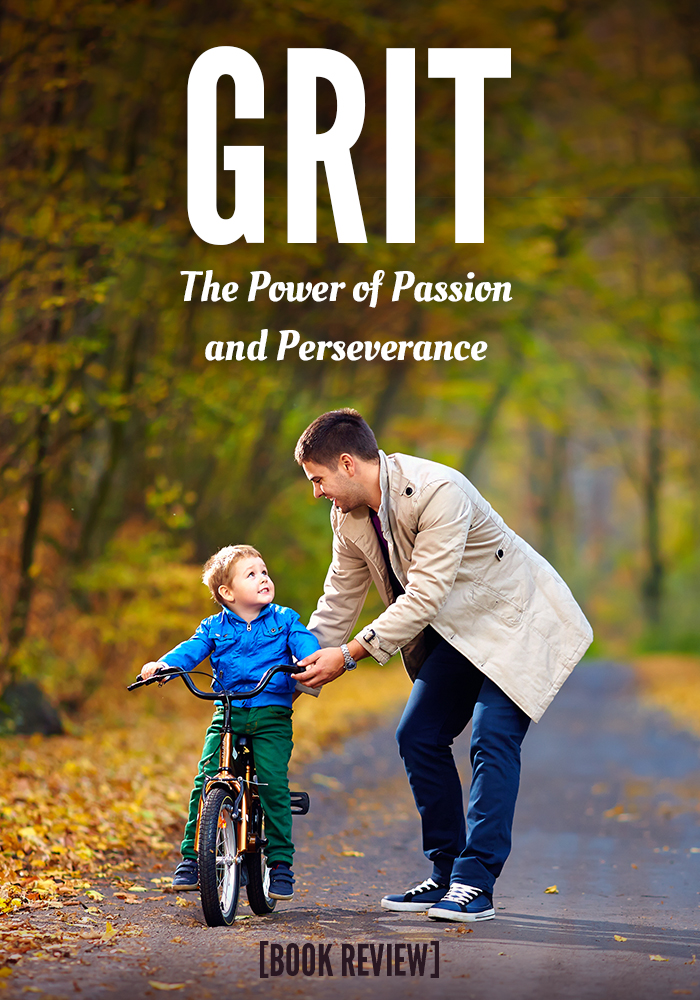Grit: The Power of Passion and Perseverance [Book Review]

In her groundbreaking book Grit: The Power of Passion and Perseverance, Angela Duckworth – a psychology professor and 2013 MacArthur Fellow – introduces us to David. She recounts how while taking a freshman high school algebra course, David’s first math test came back with a D. In her interview with David, she asked him how he dealt with that disappointing result. He said: “I did feel bad – I did – but I didn’t dwell on it. I knew it was done. I knew I had to focus on what to do next. So I went to my teacher and asked for help. I basically tried to figure out, you know, what I did wrong. What I needed to do differently.” Duckworth reports that “by senior year, David was taking the harder of Lowell’s two honors calculus courses.”
David’s story might seem rather surprising. Duckworth observes that “conventional wisdom says that math is a subject in which the more talented students are expected to excel, leaving classmates who are simply ‘not math people’ behind.” While we tend to think of riding a bike as something anyone can learn with dedication, effort, and time, we are also used to thinking that math comes naturally to those who are good at it, and that if it doesn’t come naturally, it cannot be learned. But the more Duckworth paid attention to both her teaching and the research she was conducting, the more she realized that talent isn’t a good guide and that instead it was an attitude of grit and a willingness to grow that predicted student success. Duckworth says that initially she too had been “distracted by talent” but she slowly learned that “aptitude did not guarantee achievement.” She further writes that “during the next several years of teaching, I grew less and less convinced that talent was destiny and more and more intrigued by the returns generated by effort.”
Duckworth is quick to stress that “talent – how fast we improve in skill – absolutely matters.” But she also points out that “effort factors into the calculations twice, not once. Effort builds skill. At the very same time, effort makes skill productive.” Duckworth says talent can be a helpful boost at the beginning of the learning process, but she also notes that the best way to develop any skill is to focus on practicing at the edges of current ability, and that means embracing failure. Duckworth also warns about the danger of overemphasizing talent because it can easily lead to a fixed mindset, the kind of mindset that says “I’m not a math person so I can’t learn this” rather than allowing a growth mindset that says “I don’t know how to do this yet, but I can learn!” (You can read more about the difference between these two mindsets by reading this article.)
It isn’t just in the discipline of mathematics that grit matters. Duckworth reports on her research on competitive spellers, “Measurements of grit taken months before the final competition predicted how well spellers would eventually perform. Put simply, grittier kids went further in competition. How did they do it? By studying many more hours and, also, by competing in more spelling bees.” Duckworth also studied the military students at West Point to answer the question, “what matters for making it through Beast,” the grueling program that separates West Point grads from the dropouts. She found that the answer to that question is “not your SAT scores, not your high school rank, not your leadership experience, not your athletic ability.” Instead, “what matters is grit.”
Parenting for Grit
Duckworth devotes a whole section of her book to providing ideas for parents who want to cultivate grittiness in their children. “First and foremost,” she stresses, “there’s no either/or trade-off between supportive parenting and demanding parenting.” She notes that “it’s a common misunderstanding to think of ‘tough love’ as a carefully struck balance between affection and respect on the one hand, and firmly enforced expectations on the other” and argues that “in actuality, there’s no reason you can’t do both.”
Another piece of advice to parents is to encourage their children to play. She writes, “before those who’ve yet to fix on a passion are ready to spend hours a day diligently honing skills, they must goof around, triggering and retriggering interest.” One way to help children in this process is to encourage them to sign up for extracurriculars and also pushing them to stick with their chosen activity. Duckworth writes, “If I could wave a magic wand, I’d have all the children in the world engage in at least one extracurricular activity of their choice, and as for those in high school, I’d require that they stick with at least one activity for more than a year.” The reason for this this desire is her recognition that “kids thrive when they spend at least some part of their week doing hard things that interest them.”
The point about sticking with activities is crucial. Duckworth notes that passion has less to do with intensity and more to do with consistency: “Enthusiasm is common. Endurance is rare.” In order to foster grit, the Duckworth family created the “The Hard Thing Rule” which has three parts:
1. Everyone – including Mom and Dad – has to do a hard thing, something that “requires daily deliberate practice.”
2. “You can quit. But you can’t quit until the season is over, the tuition payment is up, or some other ‘natural’ stopping point has arrived…In other words, you can’t quit on a day when your teacher yells at you, or you lose a race, or you have to miss a sleepover because of a recital the next morning.”
3. “You get to pick your hard thing. Nobody picks it for you because, after all, it would make no sense to do a hard thing you’re not even vaguely interested in.”
Earlier in the review, I mentioned the problem of fixed mindsets. Duckworth cautions parents that “children develop more of a fixed mindset when their parents react to mistakes as though they’re harmful and problematic.” She instead recommends that parents try to model “emotion-free mistake making.” For example, she shares about a technique where teachers “commit an error on purpose and then lets students see them say, with a smile, ‘Oh, gosh, I thought there were five blocks in this pile! Let me count again! … Great I learned I need to touch each block as I count!” If you’re anything like me, daily life provides plenty of opportunities for me to own up to honest mistakes and model a growth mindset. (For more tips on cultivating a growth mindset in yourself and your children, check out this article.)
While Duckworth believes that grit is essential for success, she thinks there are other traits that need to be cultivated alongside grit. She writes, “In assessing grit along with other virtues, I find three reliable clusters. I refer to them as intrapersonal, interpersonal, and intellectual dimensions of character. You could also call them strengths of will, heart, and mind.”
1. Intrapersonal character: this cluster includes grit as well as “self-control, particularly as it relates to resisting temptations like texting and video games.”
2. Interpersonal character: “includes gratitude, social intelligence, and self-control over emotions like anger. These virtues help you get along with – and provide assistance to – other people.”
3. Intellectual character: “includes virtues like curiosity and zest. These encourage active and open engagement with the world of ideas.”
(As a brief aside, Duckworth’s cluster of virtues is very similar to the skillsets commended by Joseph E. Aoun, president of Northeastern University, in his book on robot-proofing education.)
Finally, Duckworth warns that while grit is good, too much effort without enough rest can lead to burnout. She explains that the cardinal feature of burnout is “the feeling of exhaustion” usually accompanied by “depersonalization – the sense that you’re unconnected to the people you’re serving or working with – and also helplessness – the sense that no matter what you do or how hard you try, you’re not making progress.” The concern about burnout is real; we sometimes recommend our customers take a math break. Amanda Capps explains that a math break can be full break and other times it can mean “taking a break from the current curriculum and focusing more on math games, math apps, reading math-related literature, or reviewing concepts.” She notes that a math break “could also include applying math to real-world applications such as cooking, budgeting, or building that occur outside of a workbook!”
To conclude the review, I want to revisit the story of David. Remember that David was the high school freshman who got a “D” on his first math test, and who went on to take advanced math as a senior. As it turns out, David went on to earn a PhD in mechanical engineering and is now working at the Aerospace Corporation. Duckworth writes: “quite literally, the boy who was deemed ‘not ready’ for harder, faster math classes is now a ‘rocket scientist.’”
